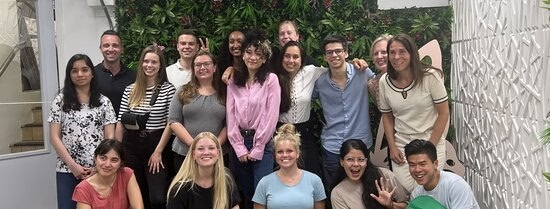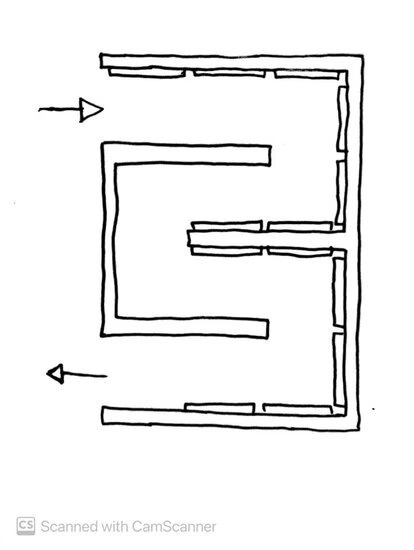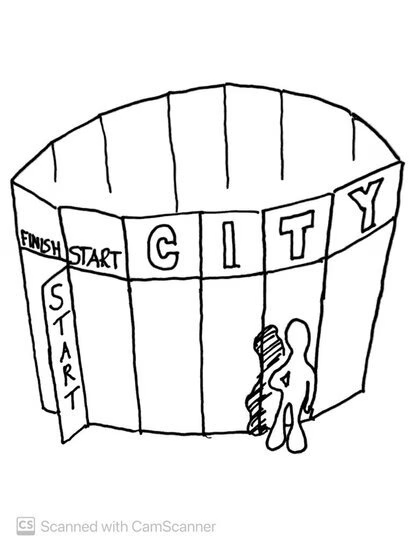On the 27th of June, the Tackling Inequalities Masters Honours Programme 2022-2023's organised a festive, final presentation. 25 master's students from across all EUR faculties presented their group projects, aimed at tackling social inequalities. From learning and defining to intervention, the final group projects were inspired by excursions to civil organizations, aimed at learning about different forms of inequalities from stakeholders' perspectives. The final projects and the event were co-created and co-defined through interacting with Rotterdam's civil actors/organizations. For instance, the founder of Recht op de Stad and Talentzkool, which the students visited, also joined the final event.
Representing the spirit of the programme
The event took place at the former Unilever building, which is currently operated by KnowledgeXY - one of the social enterprises Tackling Inequalities students have been working with. Knowledge XY teaches youth with marginalized backgrounds in Rotterdam's IJsselmonde, Feyenoord and Hoogvliet, practical skills to empower them to build their businesses and fulfil their dreams. This unique location, renovated through the help of KnowledgeXY's target group, represents the spirit of the Tackling Inequalities programme: to tackle inequalities in innovative ways and make meaningful changes through co-creation.
Tackling Inequalities Student Testimonial: Giannella Bonilla Castillo
“My name is Giannella and I participated in the Tackling Inequalities Honours Programme 2022-2023. I am a Master's student finalizing the Art, Culture, and Society track at Erasmus University. In 2005 I migrated from Ecuador to Rotterdam with my family. At the time, I learned the language and completed my secondary and higher education here. Still, I never felt at home until I started understanding the implicit ways Dutch society reinforces unevenness in our daily life. An example out of the many is how newcomers or everyone else who does not fit into a box gets cast aside through unfavorable legislation or unsympathetic representation in the media. I experienced firsthand the lack of equality in the Netherlands when I was younger. This fueled my drive to observe, understand and try to intervene in the dialogue around this topic. Through initiatives such as the Tackling Inequalities Programme, I am trying to do my part by endeavoring to create awareness and a path for change to a more inclusive society.“
Exploring and understanding social issues
“In the past six months, we have explored the city of Rotterdam and its social inequalities. The program started with masterclasses, which gave us a comprehensive understanding of how fragmented the health and care system is in the Netherlands and how this fragmentation and bureaucratization impact Rotterdam residents negatively. Later, topics around how communities tackle climate issues and housing shortages came into the conversation. Exploring these social issues through the lens of community experts and the people affected by them was highly fruitful, and, in my opinion, this approach should be considered a core part of our academic curriculum. “
Enriching personal development
“During the impact sessions, we were challenged to think outside of the box by using design tools that improved our creative thinking process, on the one hand. On the other hand, the Programme's multidisciplinary approach opened new pedagogies, enriching our interpersonal development by familiarizing us further with what it means to work with team members from different fields. A skill that is especially needed in our future career path. “
Confronting misconceptions about Rotterdam South
“City Mirror: Across the Bridge is the project my group and I presented at the end of this Programme. The project addresses the biases and misconceptions against Rotterdam South among Rotterdam citizens living outside the South. Our target group became particularly young adults between 18 and 35 years old living on the northern side of the Maas. After brainstorming and meeting with various Rotterdam residents, the Project manager at Alliantie Hand in Hand, and an Education Department staff member at Boijmans Hillevliet, we concluded that awareness about implicit biases involves discomfort. Marginalized communities have been oppressed for a long time, and in some places, they still are. Therefore, to make a positive change, the first step is to be aware of prejudices stemming from different systems of oppression, such as racism, classism, sexism, and so forth. We must admit to ourselves that we have those implicit biases. Welcoming self-reflection about these kinds of biases into our daily life cannot be achieved without people being 'temporarily' uncomfortable.”
Acknowledging and accepting differences
“Our project emphasizes the importance of acknowledging biases as a necessary step towards challenging and dismantling them, hopefully starting the conversation and increasing awareness. The project's primary goal is to encourage introspection, as the mirror represents the biases we most likely hold. The secondary objectives are to increase social cohesion and community feeling among Rotterdam residents while providing a safe space and tools for critical reflectivity, socio-political engagement, and acknowledging each other in our similarities and differences.”
Implementing and presenting the project
“We translated our idea into a 3-fold experience, including:
- An interactive installation designed as a physical mirror and placed in different art institutions in Rotterdam.
- A storytelling guided tour narrated by people who have experienced bias towards the Southern part of Rotterdam up close.
- A discussion panel.
The installation asks participants to confront their prejudices by completing subjective statements about Rotterdam South. The statements run from hostile articulated comments to more optimistic ones, which balance the scale and identify the common ground between residents. Doing this was a conscious choice, as confronting our own implicit biases could give us feelings of aversion and antipathy – people tend not to like being confronted with their own prejudices.”
Figures from City Mirror: Across the Bridge

Co-creation with stakeholders
“Working with different stakeholders on this specific topic was a highly insightful experience. During the semi-final presentation, my group and I were confronted firsthand with how implicit biases work and how people would easily overlook them. Having follow-up moments with our stakeholders ensured that our concept could be tailored in a way that marginalized communities would not be re-victimized while creating learning opportunities for those in a more privileged position. Through our curiosity and sensitivity to the topic, my group and I managed to develop a concept we were proud of and could definitely keep working on!”
Giannella's unique narrative and experience is precisely why the TI honours programme teaches about impact through the lens of co-creation. The students; innovative projects, which can truly be meaningful and impactful to their stakeholders, are exactly why we advocate for going beyond the university walls and working together with citizens.
Are you a researcher/educator that values impactful research and education? Then we encourage you to think about how we, as university actors, could go beyond the university ivory tower to create a social impact meaningful to citizens. Are you a potential EUR master's student? Then we invite you to join next year's TI honours programme!
- More information
About the Tackling Inequalities Programme
Tackling Inequalities is EUR’s interdisciplinary MA Honours Programme. Led by Jiska Engelbert, the program guides students through Rotterdam’s most pressing social issues and how to fight them. Students so not only come in contact with EUR academics, but also with a diversity of citizens –from activists to city officials—and programs aimed at advancing social justice in the city.
Vital Cities and Citizens
With the Erasmus Initiative Vital Cities and Citizens (VCC) Erasmus University Rotterdam wants to help improve the quality of life in cities. In vital cities, the population can achieve their life goals through education, useful work and participation in public life. The vital city is a platform for creativity and diversity, a safe meeting place for different social groups. The researchers involved focus on one of the four sub-themes:
- Inclusive Cities and Diversity
- Resilient Cities and People
- Smart Cities and Communities
- Sustainable and Just Cities
VCC is a collaboration between Erasmus School of Social and Behavioural Sciences (ESSB), Erasmus School of History, Culture and Communication (ESHCC) and International Institute of Social Studies (ISS).




